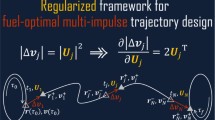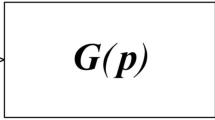Abstract
The explosive growth in air traffic as well as the widespread adoption of Operations Research techniques in airline scheduling has given rise to tight flight schedules at major airports. An undesirable consequence of this is that a minor incident such as a delay in the arrival of a small number of flights can result in a chain reaction of events involving several flights and airports, causing disruption throughout the system. This paper reviews recent literature in the area of recovery from schedule disruptions. First we review how disturbances at a given airport could be handled, including the effects of runways and fixes. Then we study the papers on recovery from airline schedule perturbations, which involve adjustments in flight schedules, aircraft, and crew. The mathematical programming techniques used in ground holding are covered in some detail. We conclude the review with suggestions on how singular perturbation theory could play a role in analyzing disruptions to such highly sensitive schedules as those in the civil aviation industry.
Similar content being viewed by others
References
M. Abbad and J.A. Filar, Perturbation and stability theory for Markov control problems, IEEE Transactions on Automatic Control 37 (1992) 1415–1420.
M. Abbad and J.A. Filar, Algorithms for singularly perturbed Markov control problems: A survey, Control and Dynamic Systems 73 (1995) 257–286.
M. Abbad, J.A. Filar and T.R. Bielecki, Algorithms for singularly perturbed limiting average Markov control problems, IEEE Transactions on Automatic Control 37 (1992) 1421–1425.
M.F. Argüello, J.F. Bard and G. Yu, A GRASP for aircraft routing in response to groundings and delays, Journal of Combinatorial Optimization 5 (1997) 211–228.
P. Atkins, Skyflow: Central traffic management system. Available as <http://www.airservices.gov.au/aic/aicfr.htm>.
K.E. Avrachenkov, Analytical perturbation theory and its applications, Ph.D. thesis, School of Mathematics, University of South Australia (April 1999).
J.E. Beasley, M. Krishnamoorthy, Y.M. Sharaiha and D. Abramson, Scheduling aircraft landings-The static case, Transportation Science 34(2) (2000) 180–197.
D. Bertsimas and S.S. Patterson, The air traffic flow management problem with enroute capacities, Operations Research 46(3) (1998) 406–422.
L. Brunetta, G. Guastalla and L. Navazio, Solving the multi airport ground holding problem, Annals of Operations Research 81 (1998) 271–287.
Y. Cheng, Network based simulation of aircraft at gates in airport terminals, Journal of Transportation Engineering 124(2) (1998) 188–196.
E.V. Denardo, Dynamic Programming: Models and Applications (Prentice-Hall, NJ, 1982).
A. Ernst, M. Krishnamoorthy and R.H. Storer, Heuristic and exact algorithms for scheduling aircraft landings, Networks 34 (1999) 229–241.
J.A. Filar, E. Altman and K.E. Avrachenkov, An aymptotic simplex method for singularly perturbed linear programs, Technical Report, Centre for Industrial and Applicable Mathematics, University of South Australia (1999).
J.A. Filar and A. Haurie, Optimal ergodic control of singularly perturbed hybrid stochastic systems, in: Lectures in Applied Mathematics, Proceedings of the 1996 AMS-SIAM Summer Seminar (1997) pp. 101-126.
E.P. Gilbo, Airport capacity: Representation, estimation, optimization, IEEE Transactions on Control Systems Technology 1(3) (1993) 144–154.
E.P. Gilbo, Optimizing airport capacity utilization in air traffic flow management subject to constraints at arrival and departure fixes, IEEE Transactions on Control Systems Technology 5(5) (1997) 490–503.
R. Hoffman and M.O. Ball, A comparison of formulations for the single airport ground holding problem with banking constraints, Operations Research 48(4) (2000) 578–590.
A.I.Z. Jarrah, G. Yu, N. Krishnamurthy and A. Rakshit, A decision support framework for airline flight cancellations and delays, Transportation Science 27(3) (1993) 266–280.
S. Kahne, Introduction to the special issue on air traffic control, IEEE Transactions on Control Systems Technology 1(3) (1993) 133–137.
P. Kall and S.W.Wallace, Stochastic Programming (Wiley, New York, 1994).
T. Kato, Perturbation Theory for Linear Operators (Springer, Berlin, 1995).
L. Lettovský, Airline operations recovery: An optimization approach, Ph.D. thesis, Georgia Institute of Technology (1997).
S. Luo and G. Yu, On the airline schedule perturbation problem caused by the ground delay program, Transportation Science 31(4) (1997) 298–311.
L. Navazio and G. Romanin-Jacur, The multiple connections multi airport ground holding problem: Models and algorithms, Transportation Science 32(3) (1998) 268–276.
A.A. Pervozvanskii and V.G. Gaitsgori, Theory of Suboptimal Decisions: Decomposition and Aggregation (Kluwer Academic, Boston, 1988).
M.D. Peterson, D. Bertsimas and A.R. Odoni, Decomposition algorithms for analyzing transient phenomena in multiclass queuing networks in air transportation, Operational Research 43(6) (1995) 995–1011.
O. Richetta, Ground holding strategies for air traffic control under uncertainty, Ph.D. thesis, Operations Research Center, Massachusetts Institute of Technology (1991).
O. Richetta and A.R. Odoni, Solving optimally the static ground holding policy problem in air traffic control, Transportation Science 27(3) (1993) 228–238.
O. Richetta and A.R. Odoni, Dynamic solution to the ground-holding problem in air traffic control, Transportation Research-A 28A(3) (1994) 167–185.
R.H. Storer, K. Naphade and S.D. Wu, Problem space search algorithms for resource constrained project scheduling, Annals of Operations Research 70 (1997) 307–326.
D. Teodorovic and S. Guberinic, Optimal dispatching strategy on an airline network after a schedule perturbation, European Journal of Operational Research 15 (1984) 178–182.
D. Teodorovic and G. Stojkovic, Model for operational daily airline scheduling, Transportation Planning and Technology 14(4) (1990) 273–285.
D. Teodorovic and G. Stojkovic, Model to reduce airline schedule disturbances, Journal of Transportation Engineering 121(4) (1995) 324–331.
M. Terrab and A.R. Odoni, Strategic flow management for air traffic control, Operations Research 41(1) 1992) pp. 243–248.
H.C. Tijms, Stochastic Models: An Algorithmic Approach (Wiley, New York, 1994).
A. Vasquez-Marquez, American Airlines Arrival Slot Allocation System (ASAS), Interfaces 21(1) (1991) 42–61.
P.B.M. Vranas, D. Bertsimas and A.R. Odoni, Dynamic ground holding policies for a network of airports, Transportation Science 28(4) (1994) 275–291.
S. Yan and Y.-P. Tu, Multifleet routing and multistop flight scheduling for schedule perturbation, European Journal of Operational Research 103 (1997) 155–169.
S. Yan and D.-H. Yang, A decision support framework for handling schedule perturbation, Transportation Research-B 30(6) (1996) 405–419.
S. Yan and H. Young, A decision support framework for multi-fleet routing and multi-stop flight scheduling, Transportation Research-A 30(5) (1996) 379–398.
Author information
Authors and Affiliations
Rights and permissions
About this article
Cite this article
Filar, J.A., Manyem, P. & White, K. How Airlines and Airports Recover from Schedule Perturbations: A Survey. Annals of Operations Research 108, 315–333 (2001). https://doi.org/10.1023/A:1016079600083
Issue Date:
DOI: https://doi.org/10.1023/A:1016079600083




